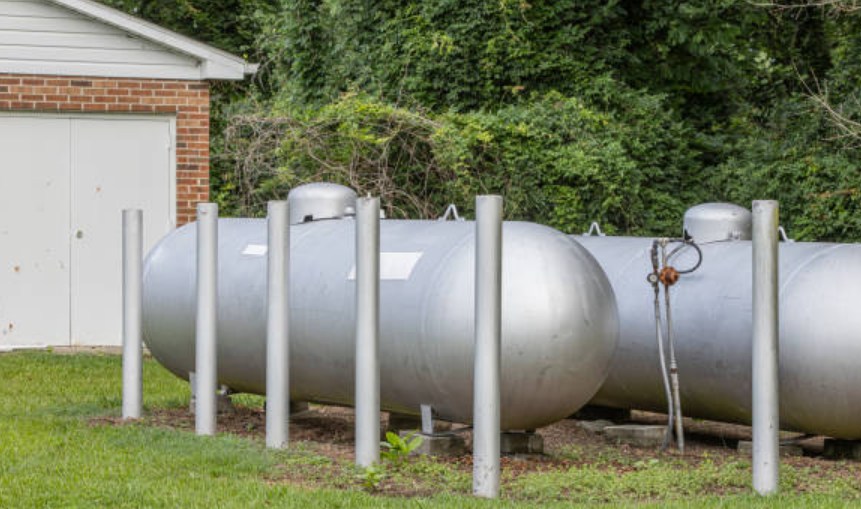Propane cylinders are essential for operation of many household, business and agricultural appliances and equipment. One of the most common above ground propane tanks is the 250 gallon propane tank. It’s the perfect combination of capacity and usability, which is a useful option to a lot of people.
Thank you for reading this post, don't forget to subscribe!This guide will explore the different 250-gallon propane tank dimensions, as well as how they’re used, installed and maintained. Whether you are thinking about installing a tank at home or you are planning to add a tank for your business, you’ll learn what you need to know to make the right decision.
Understanding 250-Gallon Propane Tanks
Dimensions and Capacity
A typical 250-gallon propane tank is 7.5 feet long with a 30 inch diameter. The door/tank weighs about 483 pounds empty. It can hold about 200 gallons of propane even though, true to its name, tanks are not filled all the way, for safety reasons. This volume provides a ready reserve and also allows for propane expansion with temperature which is comfortable.
A 250-gallon tank is ideal for smaller and cramped spaces, namely areas that demand extra capacity or smaller load-bearing.
Common Applications for 250-Gallon Propane Tanks
Usages for 250 gallon propane tanks Given the right size and the right place setting these small personal action-hero-sized tanks are used to power electrical generators that are used for outdoor events and workers that have to get the job done, even during blackouts.
Residential Use
A 250-gallon propane tank is also known as a propane gas war and will work to power home appliances. A tank of this size is usually sufficient for a home of 1,000 to 1,500 square feet, depending on usage.
Small Businesses
For small businesses — a restaurant, a farm, a workshop — a 250-gallon tank can provide gas to power the basics. Whether you’re working commercial-grade grills or simply heating a office space, propane’s consistent source of fuel makes it perfect for heating.
Agricultural Purposes
Farmers use propane for a lot of things: to fuel irrigation systems, heaters in livestock barns, grain dryers, and more. The 250-gallon capacity provides flexibility for smaller operations or as a backup fuel source.
The Benefits of 250-Gallon Propane Tanks
Cost-Effective Energy Solution
Propane is a cost-effective source of energy for a multitude of uses, much better and cheaper than electricity and other fossil fuels. With good planning, you can have refills timed for when you’re likely to get the best price on propane, which is usually off-peak season and definitely in warmer months.
Environmentally Friendly
Propane is considered a green fuel, emitting less heat-trapping CO2 than coal or oil. Propane is an environmentally friendly alternative that can serve as a solid source of energy.
Versatility
Whether it’s for heating, generator fuel, cooking, or irrigating, propane can do the job in a variety of ways, which is one reason why homeowners and business owners as well can rely on propane as a source of energy.
Installation Requirements
Thoroughly installing your 250-gallon propane tank is essential to compliance with all regulations. Always hire certified professionals to ensure the tank is safely secured and placed in the right spot.
Safety Regulations
- Distance Clearance: Propane tanks do need to meet specific distance clearances. A 250-gallon tank, for example, must be at least 10 feet from buildings or property lines.
- Base: There shall be a solid and level foundation able to support the tank (concrete pad or compacted gravel) to preclude tipping.
Professional Installation
A Qualified full service propane supplier or technician is able to oversee each step of the procedure and provides proper connections to a gas appliance and pilots.

Maintenance for 250-Gallon Propane Tanks
Regular Inspections
It is important to keep up regularly with the inspecting of your propane tank. Inspect for corrosion, cracks or dents on the outside. By the hands of a trained professional Valves, regulators and connections can be checked thoroughly.
Leak Detection
Propane leaks are uncommon, but they can be very dangerous. Propane smells really bad, like rotten eggs, which is a built-in warning signal. If you do smell propane, do not attempt to light the appliance yourself.
Cost Considerations
Purchase vs. Lease
If you are purchasing a 250-gallon propane tank, you have to determine whether it is better to buy or to lease it. Buying means higher upfront costs and you own the system outright, while leasing usually requires little to no upfront fees, but the company that installed the system will charge you over the years.
Factors Affecting Price
- Material: Tanks are available in steel or gaivanneal to affect strength and cost.
- Set Up Expenses: Labor, permits and extra materials like concrete pads.
- Supplier Rates: Propane prices can vary in cost, and suppliers might have discount programs or maintenance contracts.
Safety Tips
Safety-Propane is safe when stored and handled within specifications. There are some safety tips to observe while using a 250-gallon propane tank:
- Keep tanks away from obnoxious Smoking or Open Flame while in use or refill.
- Alongside is a Carbon Monoxide Detector to keep tabs on the air quality inside the house.
- Get to know where your emergency shutoff valves are so you can quickly turn gas off in case it’s necessary.
Environmental Impact
By making the switch to propane, you can reduce your business’ or household’s carbon footprint significantly. Propane generates 12 percent less CO2 than oil and approximately 50 percent less than coal. Also waste is minimized and better functions in the propane storage and delivery systems.
Regulations and Compliance
Before you buy or rent a 250 gallon propane tank, learn what you need to know about both local and federal regulations—read on to learn more! Regulations can differ from state to state, regulating everything from placement to insurance coverage requirements.
The Future of Propane
Innovations
The propane industry is always innovating, such as with the upcoming rollout of renewable propane that is produced from waste products and has an even lower environmental footprint. The emergence of propane fuel cells, and its hybrid systems are also promising approaches towards sustainable energy.
Sustainable Practices
“Collaborations between local propane suppliers and environmental groups have already begun to demonstrate the development of cleaner production processes and greener infrastructure across the country. When you select propane, you are investing in an energy future that’s focused on sustainability.
Why 250-Gallon Propane Tanks Are the Right Choice
Ideal for small homes, small businesses, and farms, 250-gallon propane tanks are a good solution. With their manageable size, reasonable cost, and versatility they are a staple for a reason. With an understanding of installation, safety and maintenance practices, you can continue to enjoy the benefits of propane while keeping your home and everyone in it safe.
Interested in taking propane into your home or business? Contact a certified dealer or propane technician to discover your best options and begin enjoying cost effective, clean energy now.



